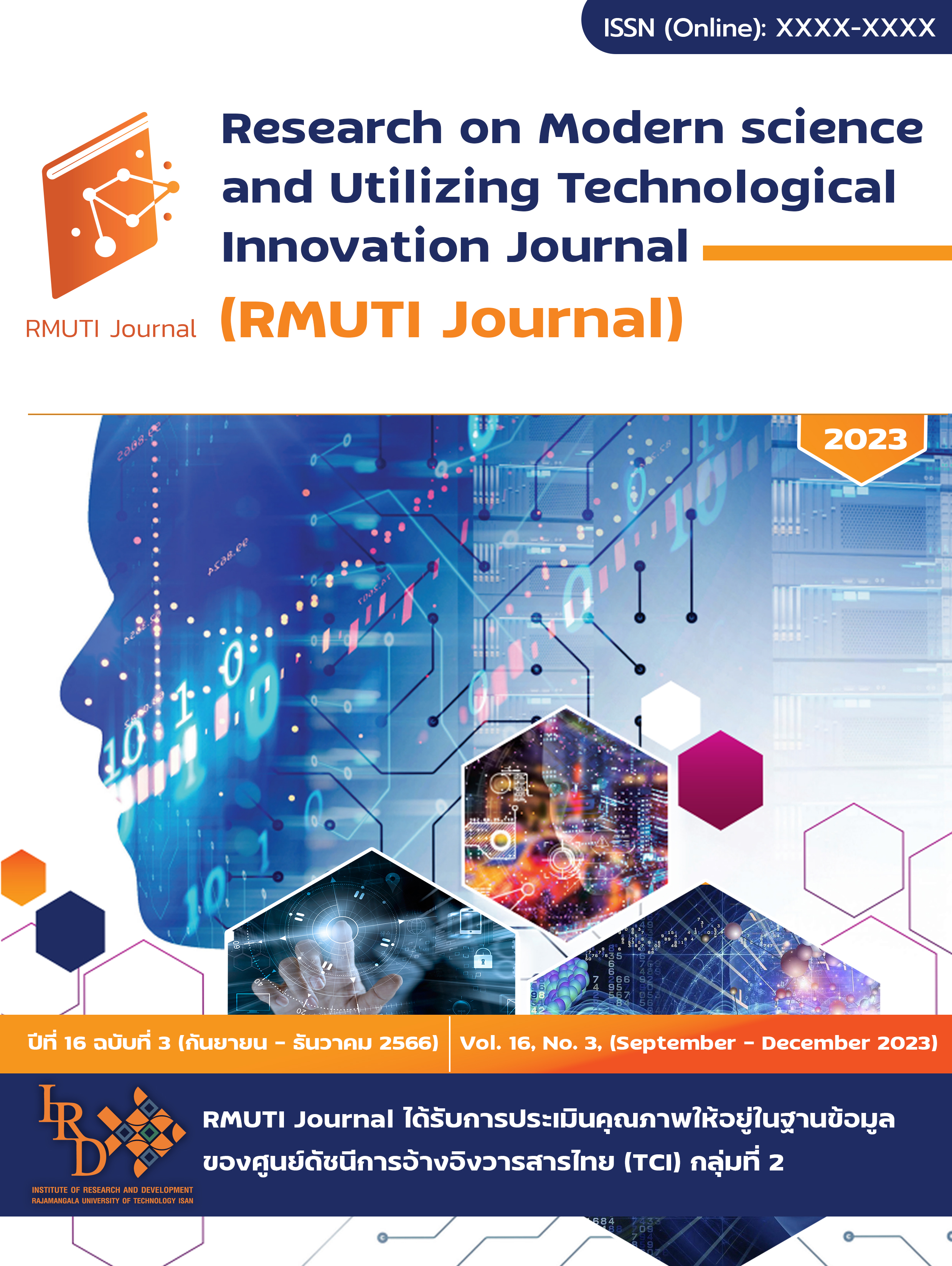A Study of Laser Ablation Simulation on Lead Telluride
Main Article Content
Abstract
This objective of this research was to study the simulation of laser ablation on thermoelectric material (Lead Telluride: PbTe). The temperature change caused by laser beam ablation on PbTe target was simulated using both COMSOL Multiphysics 5.5 and ANSYS 2021 R1 finite element analysis software packages. The laser power varied between 10 to 40 W, while the speeds ranged from 1000 to 4000 rpm. The results showed that at any given laser speed, the local maximum temperature on PbTe increased with an increase in the laser power. The maximum temperature decreased with an increase in the laser speed at a constant laser power. The moving point heat source of laser at 20 W gave the maximum temperature, which was slightly higher than the melting point of PbTe, potentially resulting in the generation of PbTe nanoparticles. The results obtained from both software differed by about 10 %. Both software can be used to simulate completely and even more effective in the future.
Article Details

This work is licensed under a Creative Commons Attribution-NonCommercial-NoDerivatives 4.0 International License.
References
Chubilleau, C., Lenoir, B., Migot, S., and Dauscher, A. (2011). Laser Fragmentation in Liquid Medium: A New Way for the Synthesis of PbTe Nanoparticles. Journal of Colloid and Interface Science. Vol. 357, Issue 1, pp. 13-17. DOI: 10.1016/j.jcis.2011.01.057
Kosalathip, V., Dauscher, A., Lenoir, B., Migot, S., and Kumpeerapun, T. (2008). Preparation of Conventional Thermoelectric Nanopowders by Pulsed Laser Fracture in Water: Application to the Fabrication of a pn Hetero-Junction. Applied Physics A. Vol. 93, pp. 235-240. DOI: 10.1007/s00339-008-4650-8
Phae-ngam, W., Suchat, S., Kumpeerapun, T., and Kosalathip, V. (2014). Influence of Air Annealing on the Structural, Morphology and Optical Properties of ZnSe Thin Films by CW-CO2 Laser Evaporation. Advanced Materials Letters. Vol. 9, Issue 5, pp. 496-500. DOI: 10.5185/amlett.2014.4577
Samantaray, M., Sahoo, S., and Thatoi, D. (2018). Computational Modeling of Heat Transfer and Sintering Behavior During Direct Metal Laser Sintering of AlSi10Mg Alloy Powder. Comptes Rendus Mecanique. Vol. 346, Issue 11, pp. 1043-1054. DOI: 10.1016/j.crme.2018.08.006
Indhu, R., Loganathan, S., Vijayaraghavan, L., and Soundarapandian, S. (2018). A Study on Continuous Beam Laser Welding of Dissimilar Materials Using Multi-Physics Simulation. Materials Science. COMSOL Conference 2020
Said-Bacar, Z., Leroy, Y., Antoni, F., Slaoui, A., and Fogarassy, E. (2011). Modeling of CW Laser Diode Irradiation of Amorphous Silicon Films. Applied Surface Science. Vol. 257, Issue 12, pp. 5127-5131. DOI: 10.1016/j.apsusc.2010.11.025
Luo, D., Wang, R., Yan, Y., Sun, Z., Zhou, W., and Ding, R. (2021). Comparison of Different Fluid-Thermal-Electric Multiphysics Modeling Approaches for Thermoelectric Generator Systems. Renewable Energy. Vol. 180, pp. 1266-1277. DOI: 10.1016/j.renene.2021.09.033
Phae-Ngam, W., Kosalathip, V., Kumpeerapun, T., Limsuwan, P., and Dauscher, A. (2011). Preparation and Characterization of Tellurium Nano-particles by Long Pulsed Laser Ablation. Advanced Materials Research. Vol. 214. pp. 202-206. DOI: DOI:10.4028/www.scientific.net/AMR.214.202
Caiazzo, F. and Alfieri, V. (2018). Simulation of Laser Heating of Aluminum and Model Validation via Two-Color Pyrometer and Shape Assessment. Materials. Vol. 11, Issue 9, p. 1056. DOI: 10.3390/ma11091506
El-Sharkawy, A. A., Abou EI-Azm, A. M., Kenawy, M. I., Hillal, A. S., and Abu-Basha, H. M. (1983). Thermophysical Properties of Polycrystalline PbS, PbSe, and PbTe in the Temperature Range 300-700 K. International Journal of Thermophysics. Vol. 4, pp. 261-269
Hwang, J. -Y., Kim, E. S., Hasan, S. W., Choi, S. -M., Lee, K. H., and Kim, S. W. (2015). Reduction of Lattice Thermal Conductivity in PbTe Induced by Artificially Generated Pores. Advances in Condensed Matter Physics. Vol. 2015, pp. 1-6. DOI: 10.1155/2015/496739
Dughaish, Z. H. (2002). Lead Telluride as a Thermoelectric Material for Thermoelectric Power Generation. Physica B: Condensed Matter. Vol. 322, Issue 1-2, pp. 205-223. DOI: 10.1016/S0921-4526(02)01187-0
Shatma, P., Dubey, A. K., and Pandey, A. K. (2014). Numerical Study of Remperature and Stress Fields in Laser Cutting of Aluminium Alloy Sheet. Procedia Materials Science. Vol. 5, pp. 1887-1896. DOI: 10.1016/j.mspro.2014.07.510
Kosky, P., Balmer, R., Keat, W., and Wise, G. (2013). Exploring Engineering. Academic Press
Hitesh, D. V., Santhanakrishnan, S., Harimkar, S. P., Sandra, K. S. B., and Dahotre, N. B. (2013). One-Dimensional Multipulse Laser Machining of Structural Alumina: Evolution of Surface Topography. The International Journal of Advanced Manufacturing Technology. Vol. 68, pp. 69-83. DOI: 10.1007/s00170-012-4709-8
Phae-ngam, W., Kosalathip, V., Kumpeerapun, T., Limsuwan, P., and Dauscher, A. (2011). Synthesis and Characterize of Bi0.6Sb1.4Te3 Nano-particles from Long Pulsed Laser Ablation. Journal of Applied Sciences. Vol. 11, Issue 21, pp. 3625-3629. DOI: 10.3923/jas.2011.3625.3629
Linsen, S. and Guoquan, S.(2012). Temperature Field Simulation of Laser Drilling in ANSYS. Advances in Intelligent Systems Research. In Proceedings of the 1st International Conference on Mechanical Engineering and Material Science (MEMS 2012). DOI: 10.2991/mems.2012.139


